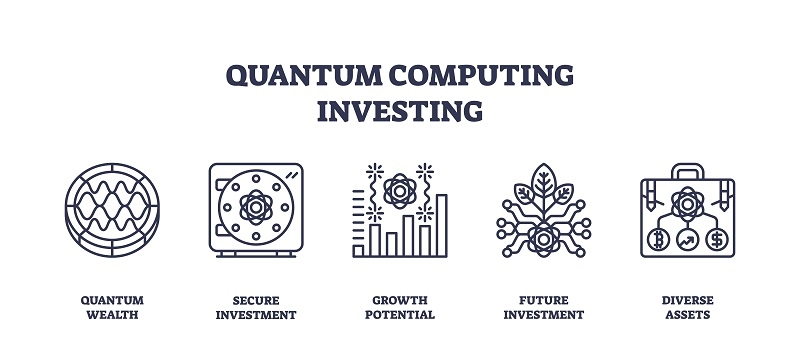
The quantum revolution is not a science fiction concept anymore. It is now one of the most powerful tools for labs, data centers, and boardrooms. If you are confused with term quantum computing investment, there is nothing to worry anymore because this blog will explain everything to.
It presents us a rare early window into a future that could change everything from cybersecurity to drug discovery. From beginners wondering how to invest in quantum computing or which trends to watch in this emerging frontier, the landscape is vast and a bit complex.
Even though, this topic is a bit complicated, it is quickly becoming one of the most intriguing and high-stakes opportunities of this decade.
Let us start by understanding this futuristic term.
Quantum computing is completely different from traditional computing because it does not use bits that are either 0 or 1, instead quantum systems use qubits which can exist in multiple states at once.
This enables quantum computers to process information much faster for various issues. While there is a lot of room for this field to develop, the progress has been very quick. The early adopters are preparing for a huge leap in performance that could leave the traditional systems a thing of past.
Must Read: Mastering Risk and Reward for Smarter Investment Decisions
Investors looking at the future of quantum technology are not just speculating on a buzzword. They are positioning themselves at the edge of a foundational shift in computing, similar to the rise of semiconductors or the internet.
Anyone considering this space should take a step-by-step approach. Here’s how to start without falling into the trap of overhyped trends:
It is not essential to grasp quantum mechanics, but one should know what differentiates quantum from classical computing.
Watch academic breakthroughs, government investments, and tech consortiums shaping the field.
Focusing on sectors that can be disrupted by quantum computing is essential like encryption, logistics, machine learning, and healthcare industry.
Since quantum computing is still early-stage, broad exposure is safer than betting on one outcome.
Quantum payoffs will not arrive overnight and you have to give it a good amount of time like 5 to 10 years.
Anyone asking how to invest in quantum computing should start with education, move toward diversified risk, and remain patient as the industry evolves.
Even without specific brand names, investors can look at broader areas where quantum revolution stocks might emerge:
Building scalable quantum systems, often based on superconducting circuits or trapped ions.
Designing algorithms and environments that work specifically for quantum architectures.
Making quantum computing accessible to researchers and developers through the cloud.
Creating encryption solutions that can withstand future quantum threats.
Universities and labs shaping theoretical and practical advancements.
The companies and platforms driving these themes may become the backbone of a future tech economy. Investors looking at quantum revolution stocks today are essentially early venture participants in tomorrow’s infrastructure.
Top Pick: Build Investment Portfolio Step-by-Step – Learn How
It is tempting to chase the headlines and invest in anything with the word quantum attached to it. But a more strategic approach is to watch for signals of real progress.
So how does one identify the best quantum computing companies without relying on specific names?
Here are a few pointers that you must consider before investing your money:
Look for players filing meaningful patents in quantum hardware, error correction, or software.
Collaborations with governments, labs, or universities can be signs of serious R&D.
Growing quantum teams often indicate long-term intent, not just marketing.
Involvement in open tools or platforms shows a stake in shaping the industry’s direction.
While names are not mentioned here, the strategy is very clear, it is to focus on long-term impact over short-term hype and that is how seasoned investors separate signal from noise in quantum computing investment.

In the broader ecosystem of innovation, quantum is part of a larger wave of emerging tech investment opportunities that include AI, biotech, space, and climate tech.
What makes quantum unique is its potential to supercharge these other areas:
Quantum algorithms may process massive datasets faster than classical systems ever could.
Modeling complex molecules could lead to faster drug discovery and precision treatments.
Simulating market behavior under complex variables becomes more feasible.
Solving problems with thousands of variables could transform industries from shipping to energy.
For those exploring emerging tech investment opportunities, quantum computing stands out as a high-risk, high-reward sector that may compound the impact of other technologies.
Even with its promise, quantum computing investment carries clear risks:
Predictions vary widely and some expect it to be used as a mainstream within the next five years while others believe it could take decades.
Building stable, error-free qubits at scale is still an open challenge.
Today's leading approach may not be tomorrow’s winner.
Early-stage investments often see large swings in value and sentiment.
As with all investments in disruptive technology, the key is not to predict the future perfectly but to be positioned if it breaks right.
The future of quantum technology is still not predictable because of the constant developments that are still being made. This is exactly the reason that makes this topic more compelling for people.
For those willing to learn, stay patient, and focus on long-term impact, quantum computing investment represents a rare chance to be part of a foundational shift in how information, science, and strategy converge.
Yes, it requires you to have some technical knowledge, however, even if it is early like every major revolution, the quantum computing holds immense potential. It presents you the opportunity to become a visionary and stay ahead of the competition.
This content was created by AI